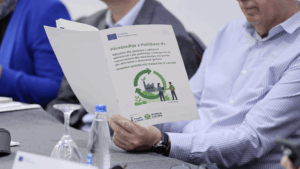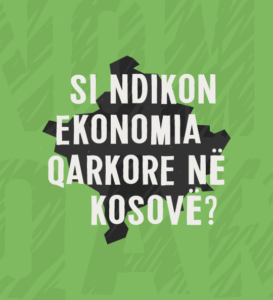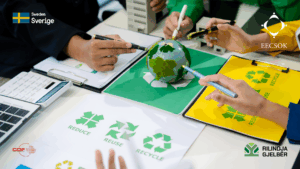Kosovo’s Law on Waste Management (Law No. 04/L-060)
Introduction
Kosovo continues to face significant environmental and public health challenges as a result of inefficient waste management practices. The overreliance on landfills, the prevalence of illegal dumping, low recycling rates, and the lack of sustainable waste infrastructure contribute to the deterioration of ecosystems and public spaces across the country.
To address this growing concern, Kosovo has enacted the Law on Waste Management (Law No. 04/L-060), a key legislative instrument designed to improve waste handling, reduce environmental degradation, and align Kosovo with European Union (EU) environmental directives.
The law establishes a comprehensive framework that promotes sustainable consumption, responsible waste disposal, recycling, and the gradual transition towards a circular economy. With its implementation, Kosovo aims to reverse its dependency on landfilling and open dumping by fostering material recovery, waste minimization, and resource efficiency.
The Purpose and Vision Behind the Law
At its core, Law No. 04/L-060 serves as a cornerstone for Kosovo’s national strategy on environmental protection. The legislation seeks to:
- Mitigate the environmental and health impacts of poor waste management practices.
- Increase national recycling and reuse rates.
- Regulate hazardous waste streams to prevent contamination of Kosovo’s air, water, and soil.
- Improve institutional responsibility for waste handling across municipalities, industries, and businesses.
- Foster public awareness on sustainable waste management.
The law provides the legal and institutional tools necessary to support Kosovo’s transition from a linear “take-make-dispose” economy toward a circular model, in which materials are continually reused, recycled, and reintegrated into production cycles.
Strategic Goals of the Law
The law outlines key objectives designed to create a systemic shift in waste management practices throughout the country:
- Reduce overall waste generation by promoting waste prevention strategies and sustainable consumption patterns.
- Encourage recycling and reuse across sectors to reduce reliance on landfilling and incineration.
- Ensure the safe disposal of hazardous waste, with strict handling and treatment requirements.
- Introduce the “polluter pays” principle, requiring waste producers—including businesses and individuals—to be accountable for the environmental costs of the waste they generate.
- Strengthen monitoring and enforcement mechanisms, improving regulatory oversight and increasing penalties for non-compliance.
These measures are intended to drive Kosovo closer to EU environmental compliance while enhancing the country’s resource security and public health outcomes.
Core Provisions of the Law
Waste Classification and Streamlined Collection
The law mandates rigorous waste classification, requiring waste to be separated into distinct categories to facilitate more efficient recycling and treatment. These categories include:
- Municipal solid waste (household and commercial).
- Hazardous waste (including industrial chemicals, electronic waste, and medical waste).
- Organic waste (biodegradable waste from households, agriculture, and food services).
- Construction and demolition waste (materials such as concrete, bricks, and metals).
This waste separation is essential to reduce contamination of recyclables and to improve the efficiency of recycling plants and material recovery facilities.
Hazardous Waste Control and Safe Disposal Measures
One of the law’s most stringent requirements involves the safe management of hazardous waste, which presents significant environmental and health risks when improperly handled.
Key provisions include:
- Mandatory licensing and permitting processes for businesses handling hazardous materials.
- Regular monitoring of toxic waste streams, with clear guidelines on safe treatment and disposal methods.
- Substantial fines and legal penalties for non-compliance or improper disposal.
By addressing hazardous waste management, the law aims to prevent soil, water, and air contamination, safeguarding public health and local ecosystems.
Advancing Recycling and Circular Economy Principles
The legislation prioritizes recycling and material recovery as key strategies for reducing landfill dependency. Municipalities and businesses are required to:
- Establish and expand municipal recycling programs, diverting waste from landfills to material recovery facilities.
- Implement waste prevention initiatives, encouraging industries to reduce waste generation at the production stage.
- Adopt circular economy models, focusing on waste-to-resource solutions such as remanufacturing, upcycling, and composting.
- Launch public education campaigns to promote recycling best practices.
Encouraging circular approaches will not only reduce waste accumulation but will stimulate green innovation and support economic diversification.
Municipal Waste Management Obligations
Local authorities have direct responsibilities under the law to ensure that waste management services meet environmental and public health standards. These include:
- Providing reliable waste collection and sorting infrastructure in both urban and rural areas.
- Ensuring that landfill operations comply with national environmental regulations and international best practices.
- Conducting awareness-raising activities to promote responsible waste behavior among citizens.
Municipalities that fail to meet these obligations may be subject to financial penalties or legal proceedings, reflecting the importance of accountability in waste governance.
Persistent Challenges in Kosovo’s Waste Management System
Despite the legal framework in place, Kosovo’s waste sector faces multiple implementation challenges that undermine its potential effectiveness:
- Low recycling rates: Without a national waste separation system and sufficient incentives, most recyclables are sent to landfills.
- Illegal dumping: Unregulated waste disposal in forests, rivers, and public spaces remains widespread, particularly in rural areas.
- Absence of waste-to-energy (WtE) facilities: Unlike many EU countries, Kosovo lacks infrastructure to convert non-recyclable waste into energy, limiting waste recovery options.
- Weak regulatory enforcement: Limited human and financial capacity among oversight bodies leads to poor implementation of existing laws.
Strengthening Kosovo’s Waste Management: Recommended Actions
To achieve the law’s intended impact, Kosovo must adopt comprehensive reforms and strategic investments, including:
-
Modernizing Recycling Infrastructure
Invest in state-of-the-art recycling plants capable of processing a variety of waste streams, including plastics, glass, paper, organics, and construction materials. -
Implementing Extended Producer Responsibility (EPR)
Adopt EPR schemes, requiring producers to fund the collection, treatment, and recycling of products, particularly packaging waste and electronics. -
Expanding the Deposit Refund System (DRS)
Introduce a nationwide deposit system for beverage containers to reduce litter and increase collection rates for PET, glass, and aluminum. -
Strengthening Law Enforcement
Provide more resources to environmental inspectorates and improve coordination between national and municipal authorities to combat illegal dumping and non-compliance. -
Promoting Green Public-Private Partnerships
Foster partnerships between public institutions and the private sector to develop circular economy hubs, support green startups, and create local supply chains for secondary raw materials.
Citizen and Business Engagement: A Critical Component
A successful waste management system relies on the active participation of all stakeholders. Here’s how citizens and businesses can contribute:
- Separate waste at home and at work—correctly sort recyclables, organic waste, and hazardous materials.
- Support and participate in local recycling initiatives—utilize designated collection points and avoid contaminating recycling streams.
- Reduce consumption of single-use items—opt for reusable products and packaging wherever possible.
- Advocate for sustainable business practices—support companies that implement circular economy principles and transparent waste management strategies.
- Report illegal dumping to municipal authorities to help protect the environment and public spaces.
Conclusion: Toward a Circular Waste System for Kosovo
The adoption of Law No. 04/L-060 marks a decisive step in Kosovo’s environmental policy landscape. However, true progress requires more than legislation—it demands coordinated action between institutions, businesses, and communities to foster a culture of responsible waste generation, separation, and recycling.
By investing in modern waste processing infrastructure, expanding circular economy initiatives, and prioritizing enforcement, Kosovo can reduce pollution, create green jobs, and align with EU waste management directives.
A well-implemented waste management strategy is not only crucial for protecting Kosovo’s ecosystems and public health but is essential for building a competitive and sustainable economy in the years ahead.





